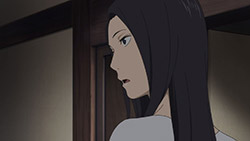 |
 |
 |
 |
 |
 |
 |
 |
 |
 |
 |
 |
 |
 |
 |
 |
 |
 |
 |
 |
 |
 |
 |
 |
 |
 |
 |
 |
 |
 |
 |
 |
 |
 |
 |
 |
「恋」 (Koi )
“Love”
Who knew the mundane could be so breathtaking?
This post will be on the brief side, because my thoughts of Fune wo Amu are relatively simple: After this episode it’s my new favourite of the Fall season. I’m lucky that my three blogging choices are effectively fighting for the top spot, with Fune wo Amu proving that it’s entirely different from everything else currently airing (and that’s not to discredit everything else that’s out there – but mainly to highlight just how different this is from the norm). I love anime that stray from the mainstream and don’t feel calculated. This episode of Fune wo Amu was simple – so simple that it’d be hard to make a lengthy post out of the details revealed – but that doesn’t mean it was bad.
Truthfully, I was floored by this episode. Not by some grandiose reveal or a showstopping scene, but because of how down to earth and true to life these characters feel. Their conversations come and go and flow like the waves; not every detail is essential, but then again everyday life has its mundane moments that shape our experiences. The fact that I’m content with these characters – without a super power or high school uniform in sight – just sitting around a restaurant table or at their workplace as they mingle or go about their duties is testament to how real they feel. As someone who aspires to one day put his own fiction out into the world, I hope my characters can be viewed as real people rather than fictional creations based off whims and personal fantasies. Fune wo Amu has that nailed.
The dictionary research continues, and we find out that poor Majime is a virgin. It’s a pretty common trope, but way more interesting considering this is a cast consisting of adults from their 20s to retirement. Their reaction to his sexual inexperience is curious in how downplayed it is, yet it manages to relate to the work process as Majime gets flustered over the sight words that are out of his comfort zone. This is all brought up due to the “love” that Majime has found after encountering Hayashi Kaguya (Sakamoto Maaya), a compelling woman with a fitting name after her moonlit introduction last week. Her chance encounter with Majime turns out to be less fantasy than I would have guessed, though Majime clearly thought himself in a dream-like state during the whole thing. Once he realises that this beautiful and fascinating woman is his new neighbour, he’s left speechless, as she carries the conversation with her charm and confidence. They’re worlds apart, but I expect a key focus of Fune wo Amu will be them getting closer and perhaps discovering what it means to fall in love for real.
Poor Majime is hopeless, his workmates are amusing, and Kaguya is proving instantly likeable – more like a novel character than an anime/manga/light novel creation, which is exactly what I’d expect here. It was a simple episode carried by its believable conversations, its characters that feel and act like people, and consistently pretty visuals that manage to impress in the moments that matter most. Everything is positively glowing right now, and I can’t wait to watch it again come next Thursday. I’ve never felt so privileged to be a UK Amazon Prime user.

This show makes me think me of my work. In a good way.
Sounds like you have a nice job then!
This really is a wonderful anime. I loved the movie, and had high expectations for this anime. It has not disappointed.
My heart feel painful. Am I in love?
No. That’s heart burn.
Let me just say one thing: being different doesn’t always mean being better. Except in this case, it exactly means that. Loving the pacing, loving the characters, but all in all, I’ve got to say, loving the diversity this fall delivers. We have great school drama, great adult drama, some excellent sport shows (I am not following Yuri on ice unfortunately but I heard it’s good one too), some good comedies. Original ones, adaptations, sequels. Really enjoyable season, especially in comparison to summer.
It’s always more breathtaking when romance is involved, apparently. But whatever. Knowing Japan’s “Life Goes On” attitude towards endings, there’s going to be little to no resolve at the end of the series. At most, the protag and the girl are going to go on a few dates. And then it’s going to end with, “I’m going to pursue my dreams until the end!” and “I am so inspired!” Just… whatever.
I’m more keen on side chars. And the chibi dictionaries.
The subtitle for this episode doesn’t have as much hidden interpretation as the past ones (…or does it?) so I will refrain from extensive explanation. However, I do want to include a follow up from Iima Hiroaki’s commentary tweets since I appreciated what he wrote for this subtitle. In most mainstream dictionaries, the given definition/interpretation for 「恋」/Love generally describes emotions strictly between a man and woman. However, the Sanseidou dictionary defines 「恋」 as “To possess unfulfilled feelings of holding affection towards a person, to want to see that person, to always want to be by that person’s side.” (No mention of gender at all) Iima chose to provide this episode’s definition based on the nuances of Sanseidou’s dictionary.